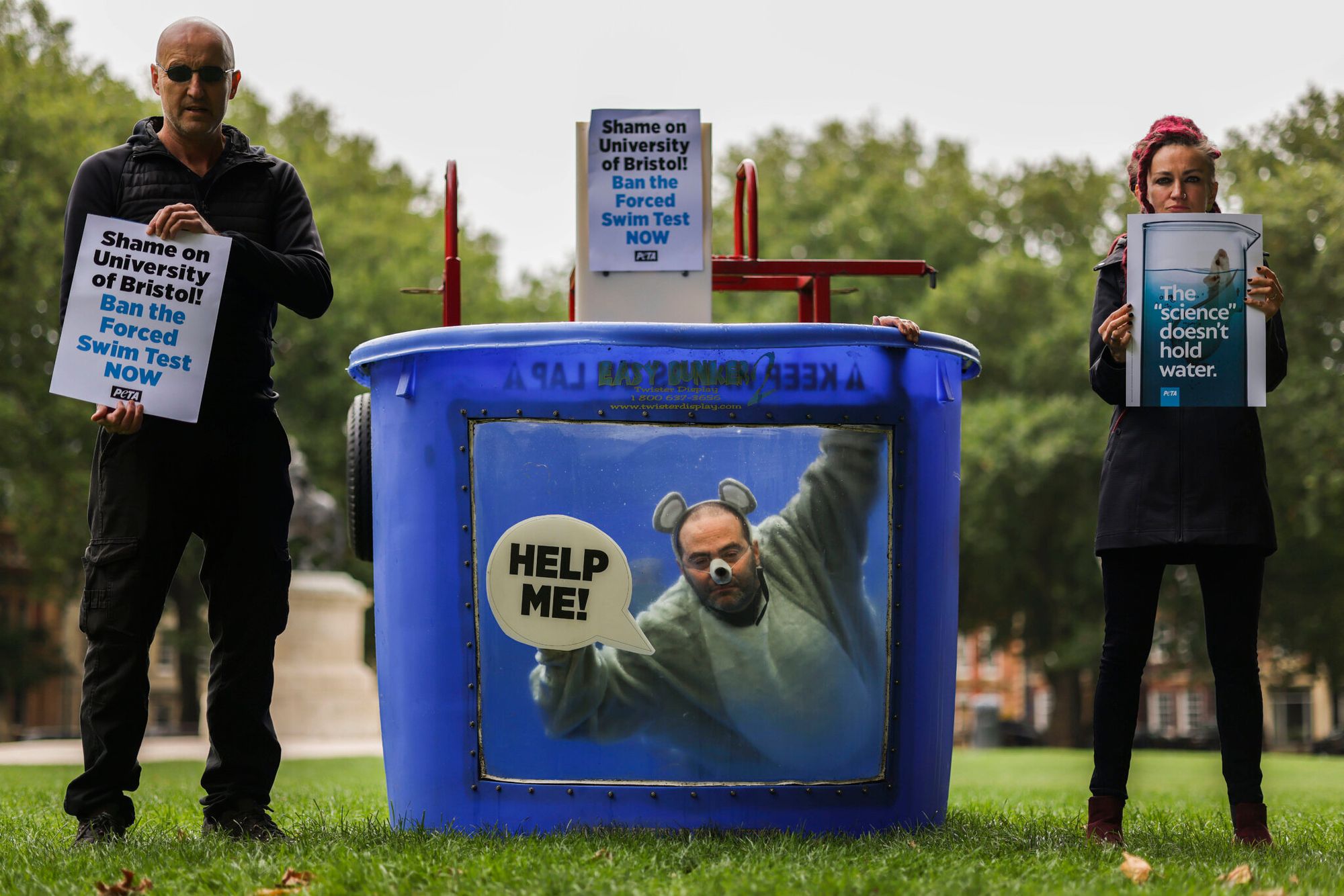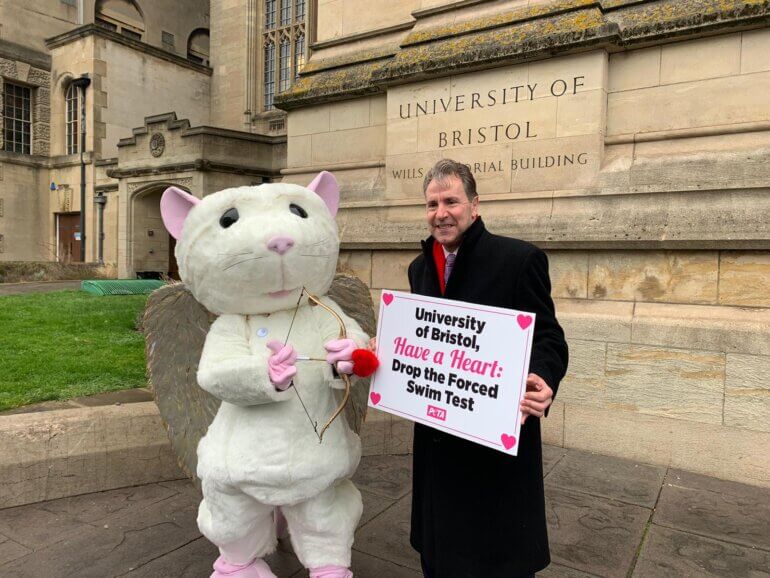By Flossie Palmer, Features Editor
In partnership with University of Bristol students, People for the Ethical Treatment of Animals (PETA) have released an open letter urging Vice-Chancellor Hugh Brady to suspend the use of the forced swim test at the University. In November 2021, Bristol SU passed a motion to publicly debunk the University’s continued use of the test, and to pressure the University not to renew its license to use the test once it expires in August 2022. However, students feel that more action is needed to prevent the University’s license from being renewed, which would allow the test to be used for a further five years.
The open letter calls for the University to protect the lives of animals, as well as its own reputation, by suspending its use of the forced swim test. It also details the criticism the test has faced by scientists from the UK government’s Medicines and Healthcare products Regulatory Agency, stating that it is a ‘poor model’ for testing the effects of human depression and highlighting the stark reality that ‘all the animals put through this traumatic experiment will eventually be killed’ after participating in the test. In its final address to the University’s Vice-Chancellor, Professor Hugh Brady, who will be moving on from the University at the end of this academic year, the letter asks Brady to ‘leave a positive legacy for both animals and science’ behind.

Epigram spoke to Dr. Julia Baines, a science policy advisor at PETA, to find out more about the University’s use of the forced swim test. Currently, the test involves small animals such as rats being put into inescapable beakers filled with water, and experimenters record how long it takes before they stop swimming and float. The forced swim test is used in an attempt to understand human stress-related diseases such as depression, anxiety and post-traumatic stress disorder (PTSD) so that suitable treatment can be designed for human use.
However, recent studies have shown that the forced swim test is not an optimised model for understanding human mental illnesses. Dr. Baines stated that; ‘Experimenters have been subjecting animals to this inhumane test for decades in an attempt to understand human depression and test antidepressant drugs. But the test has been widely criticised in terms of animal welfare and its scientific utility, with scientists arguing that floating is not a sign of despair but rather a positive sign of learning, conserving energy, and adapting to a new environment.’
‘The test is also used to cause animals to experience acute stress, a highly unethical practice. Not only are there neurobiological differences that mean that data obtained from rats cannot be translated to humans, but factors such as age, weight, sex, water temperature, environmental conditions, handling, social environment, and even diet have all been known to affect the results of the test.’
💊 Johnson & Johnson
— PETA (@peta) September 25, 2021
💊 Bayer
💊 GlaxoSmithKline
💊 AbbVie
💊 Roche
💊 AstraZeneca
💊 Novo Nordisk A/S
💊 Boehringer Ingelheim
💊 Pfizer
💊 Bristol-Myers Squibb
& three other pharma companies have banned the forced swim test after hearing from PETA scientists! #StopAnimalTests
Dr Baines went on to offer more alternatives to the forced swim test, stating that ‘The university could stop using the FST right away with no detriment to mental health research. There are plenty of human-relevant approaches that do not involve experiments on helpless animals. Researchers are already using 3D models of the brain grown from human stem cells to gain insights into mental health conditions.’
‘Mental health conditions, such as depression, are some of the most common and debilitating conditions in the world, making it vital that scientific research achieves translatable results that are relevant for human clinical practice.’
Following discussions with PETA and addressing the science which they believe disproves the effectiveness of the forced swim test, 15 companies and two universities have declared that they no longer intend to use the forced swim test, which some had previously used for depression research. These institutions include King’s College London, pharmaceutical giant GlaxoSmithKline and the UK’s most well-known Covid-19 vaccine developers, AstraZeneca, Pfizer and Johnson & Johnson. The University of Bath also suspended the use of the test as of 2019, although PETA is determined for the University to be more outspoken regarding this.
So why hasn’t Bristol followed suit?
Arabella Atkinson, a campaigner from PETA, stated that what the organisation usually receives from institutions is a ‘standard response’ which doesn’t incite change. With PETA’s open letter, written in collaboration with the University of Bristol’s VegSoc, PETA are ‘forcing [Hugh Brady’s] hand a little’ to achieve action rather than false promises and template-written statements.
PETA campaigners are on Bristol Bridge today protesting against the ‘forced swim test’ - where small animals including mice, rats, guinea pigs, hamsters and gerbils are dropped into beakers of water where they are forced to swim to prevent themselves from drowning pic.twitter.com/t2O6SrowGZ
— Martin Booth (@beardedjourno) September 23, 2021
‘Bristol is a marker of social progression and so it makes no sense that they’d be dragging their heels,’ Atkinson told Epigram. PETA are hoping that students who agree with the suspension of the forced swim test at the University will sign their open letter and have emphasised the importance of public pressure and local political support for their campaign.
On 14 February, PETA met with Dan Norris, the Mayor of the West of England, who is backing their campaign to place further pressure on the University to not renew its license. Norris later stated that; ‘Forcing frantic animals to swim for fear of drowning is cruel, and studies show it is irrelevant to depression in humans. I join PETA in urging the University of Bristol to reconsider the forced swim test and stop tormenting gentle animals in this outdated experiment.’
Alongside Dan Norris, PETA’s campaign is also supported by Kerry McCarthy, Labour MP for Bristol East.
PETA have also had a history of making their cause present in and around Bristol. In September 2021, PETA launched their billboard and dropped a giant banner over Bristol Bridge, depicting an image of a drowning rat with a statement reading ‘Shame on University of Bristol. Ban the forced swim test NOW’ to raise public awareness of their campaign. One of their most notable demonstrations in Bristol in September 2021 was the drowning of a “rat” in a tank filled with over 2000 litres of water in Queens Square, which urged the University to suspend its use of the forced swim test.

Natasha Nadel, a Bristol student and committee member of VegSoc, has been collaborating with PETA as a representative for students’ support of their campaign to end the University’s use of the test. Initially, Natasha proposed the motion which urged Bristol SU to disaffiliate themselves from the University’s use of the forced swim test and to place pressure on the University to suspend its use; this was passed in November 2021.
When asked about her involvement in PETA’s campaign, Natasha explained that ‘Not only is it cruel and inhumane, but there is just no reason for the University to still do these tests.’
On 9 February, the University released a statement regarding its use of the forced swim test in response to PETA’s campaign, which stated that:
‘We acknowledge that some people have concerns about the use of animals in research, but we also recognise that research involving animals is vital for advances in medical, veterinary and scientific knowledge to improve our understanding of health and disease and the lives of both animals and humans.’
‘As a research university, we are committed to a culture of care where animals are treated with compassion and respect.’
Animal Rights at Bristol: Has progress been made?
26,000 animals used in experiments at Bristol last year
The University’s standpoint will be revealed in August this year, when the University can make an active choice as to whether its license to use the forced swim test should be renewed. Until then, PETA’s campaign remains ongoing, with its latest demonstration being held today outside Senate House between 12-1pm, in which their rat mascot and PETA members will be collecting signatures for the open letter.
While the University’s license to use the test is drawing to a close, as with Hugh Brady’s leadership of the University, which ‘legacy,’ as PETA puts it, that Brady will choose to leave behind will be revealed in just a three month’s time.
Featured Image: Epigram / PETA
Do you think the University's use of the forced swim test should be suspended?









